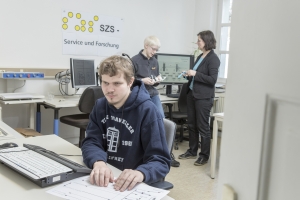The demand for information technology experts is high – qualified applicants are wanted everywhere. The IT sector also offers good employment opportunities for instance in software development teams for persons with visual impairment. The Study Centre for the Visually Impaired (SZS) at Karlsruhe Institute of Technology (KIT) in cooperation with FZI Research Centre for Information Technology will now improve the access to software development within the project “Cooperate – New Paths of Cooperation for Diversity Teams in Software Development.”
The numerous jobs offered in the IT business and in particular in the field of software development might also improve employment perspectives of visually impaired persons. However, mainly standardized graphical description languages are used. “People with blindness or low vision depend on information in textual mode,” explains Dr. Karin Müller, who heads the Cooperate project at SZS. “Due to their highly visual part, conventional modeling languages, such as the Unified Modeling Language (UML), represent a big obstacle for these persons.” Lacking accessible development software also aggravates cooperation in diversity teams, i.e. teams consisting of people with and without visual impairment. Currently pursued approaches are associated with high costs, as existing barriers are overcome by a high personnel expenditure.
This is where the “Cooperate” project starts. In the next few years, the experts will develop a cooperation tool for diversity teams. Work will be financed by the compensation fund of the Federal Ministry of Labor and Social Affairs (BMAS). This tool to be developed makes available contents in both graphical and textual format and supports various output modes, such as magnification, braille or audio output, depending on the visual impairment. The objective is that every team member, no matter with or without visual impairment, can work in a convenient representation mode. The challenge associated with the development of an accessible environment for diversity teams consists in the correct and real-time updates of all representation forms after changes. “If this requirement is met, persons without visual impairment may also profit from alternatives to graphical processing,” Dr. Henning Groenda, project manager at FZI, says.
The Cooperate project of FZI and SZS addresses persons working on the development of IT systems and qualifying and training visually impaired IT experts. In parallel to the cooperation tool, training material for visually impaired software developers will be conceived. “By creating the necessary structures, the project will contribute to the successful integration of persons with visual impairment in the labor market and to good cooperation with normal sighted persons,” Karin Müller summarizes the project.
About the SZS:
The Study Centre for the Visually Impaired has been supporting and advising students and prospective students with visual impairment in all study courses offered at KIT for many years. Thereby, students with blindness or low vision get the opportunity to study in a self-determined and inclusive way at KIT and to find access to professional life. Together with the Chair of “Computer Systems for Visually Impaired Students”, the SZS conducts research on assistive technologies and on new ways of getting access to mathematics, informatics, natural sciences, and engineering.
About the FZI:
The FZI Research Center for Information Technology at the Karlsruhe Institute of Technology is a non-profit institution for applied research in information technology and technology transfer. For 30 years, FZI has transferred latest scientific findings in information technology to companies and public institutions and qualified young people for careers in academics or business as well as self-employment. Scientists of the FZI Research Division Software Engineering contribute their expertise in the decoupling of technical and operational aspects of IT systems and the use of model-driven development techniques (MDSD) and domain-specific languages (DSL) to the project.
For further information, please contact:
Johanna Häs
Department Manager Corporate Communications and Media
FZI Forschungszentrum Informatik
Tel. +49 721 9654-904
Fax +49 721 9654-905
E-Mail: haes ∂does-not-exist.fzi de
In close partnership with society, KIT develops solutions for urgent challenges – from climate change, energy transition and sustainable use of natural resources to artificial intelligence, sovereignty and an aging population. As The University in the Helmholtz Association, KIT unites scientific excellence from insight to application-driven research under one roof – and is thus in a unique position to drive this transformation. As a University of Excellence, KIT offers its more than 10,000 employees and 22,800 students outstanding opportunities to shape a sustainable and resilient future. KIT – Science for Impact.

